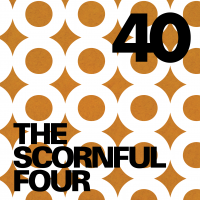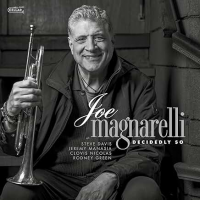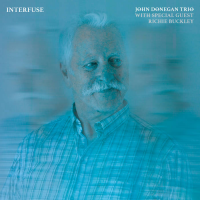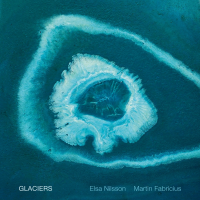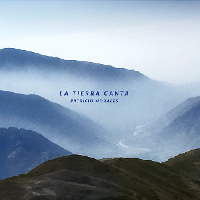Home » Jazz Articles » Album Review » Zim Ngqawana: Vadzimu
Zim Ngqawana: Vadzimu
Now Vadzimu takes the same idea deep into Xhosa territory, emphasizing a word that means "spirit" or "ancestors." Nothing could be more descriptive of the music on the record. Zim Ngqawana's roots in tribal music and the South African tradition play equal roles with New World styles including bop, funk, the avant-garde, tango, son, and samba. He's never believed in provincialism, and that's one reason Vadzimu is a masterpiece.
That's never a word to be taken lightly, so some justification is clearly in order. Ngqawana composes music in suites, each with its own coherent thematic focus and style (or mix of styles). Four such suites appear on Vadzimu : "Satire," devoted to his South African roots; "Diaspora," drawing upon the New World branches of the African musical tree; "Liberation Suite," celebrating the joys of freedom and revelation; and three relatively dark Noctures which dwell in the wee hours of the night.
Zim's always looked toward an orchestral sound, which he accomplishes here with fourteen players, though you won't ever hear them all playing at once. His three solo piano nocturnes at the end occupy the low end of the spectrum, rumbling through "Umoya," slashing wildly through "Vadzimu," and coming to reconciliation on "Thula Sizwe." It's a nice change of pace from Zim's regular pianist, Andile Yenana, who appears elsewhere on the record and insistently combines a strong sense of lush South African vocal harmony, shifting blocks of chordal sound, and pulsing rhythmic cycles. Various combinations of horns, strings, and drums (in abundance) appear here and there to enrich texture and timbre.
A brief gust of pattering drums may lull you into tranquility on the opening track, but that's soon shattered with sharp, overblown vocal cries (followed by repeated shouts and group chanting). This is the past and the future: centuries old but somehow avant-garde at the same time. That leads into "Kubi," a lush and fertile backdrop for more melodic and restrained vocals, and the syncopated stomping mineworkers' dance on "Gumboot Dance"—tap done South African style, recorded somewhere real close to the floor. The suite closes with a return: warm, uplifting slow swing with vocals.
The Diaspora suite offers the greatest mix and some of the most inspired music on the record. "Zanusi" hits New Orleans funk very lightly and from an oblique angle, connected by the leader's long flute lines. Then it's off to Cuba with richly layered percussion, authentic vocals, and lyrical flowing melodies from the brass. "Dirge" swings with perky energy, returning to the South African jazz theme that permeates the record.
Zim Ngqawana has taken this opportunity to combine compositional focus, an extended group concept, and creative improvisation. If you don't have an open mind to energy and cross-cultural fusions, don't waste your time with this record. Otherwise, I cannot recommend it highly enough. It's the best recording that has come out of South Africa in recent years. If the international jazz community doesn't open its ears to the music of Zim Ngqawana... well, that's its loss.
Visit Sheer Sound and Zim Ngqawana on the web. This recording is available from One World, Amazon, and other online sources.
Related link: All About Jazz: South Africa.
Track Listing
Satire: Umthakathi, Kubi, Gumboot Dance, Interlude, Amagoduka Part 3. Diaspora: Long Waltz to Freedom, Zanusi, Mozambique, Zimzim, Dirge. Liberation Suite: Tafelberg/Carnival Samba, Unamaquinga Na, Anthem. Nocturnes: Umoya, Vadzimu, Thula Sizwe.
Personnel
Zim Ngqawana
saxophoneZim Ngqawana: soprano, alto, tenor, baritone saxophones, flute, piccolo, double head flute, harmonica, melodica, piano, lead vocals; Marcus Wyatt: trumpet; Bheki Mbatha: trombone; Herbie Tsoaeli: bass, vocals; Merle Thomson: harp; Elizabeth Rennie: viola; Andile Yenana: piano, vocals; Lulu Gontsana, Kesivan Naidoo: drums. Basi Mahlasela, Tlale makhene, Gugu Ngwenya, Monna Mashinini, Thebe Motlhakeng: percussion. Text on Satire: Migrant Mine Workers. Story to Amagoduke narrated by Bheki Khoza.
Album information
Title: Vadzimu | Year Released: 2003 | Record Label: Sheer Sound
Tags
PREVIOUS / NEXT
Support All About Jazz
 All About Jazz has been a pillar of jazz since 1995, championing it as an art form and, more importantly, supporting the musicians who make it. Our enduring commitment has made "AAJ" one of the most culturally important websites of its kind, read by hundreds of thousands of fans, musicians and industry figures every month.
All About Jazz has been a pillar of jazz since 1995, championing it as an art form and, more importantly, supporting the musicians who make it. Our enduring commitment has made "AAJ" one of the most culturally important websites of its kind, read by hundreds of thousands of fans, musicians and industry figures every month.











